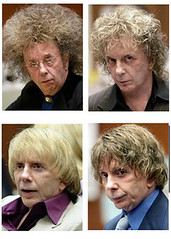Phil Spector : The Judge's Unorthodox Instructions

Update: No verdict today, the jury will resume deliberations Monday.
*******
Here's how to blow a five month trial out of a judge's desire to avoid a deadlocked jury: Let the jury deliberate a week and then change the jury instructions to add new ways the jury can find the defendant guilty. Then, suggest to the jury they change their method of deliberations.
It's hard not to be shocked by what the Judge in the Phil Spector trial did today. He went from this instruction:
...in order to convict Spector of second-degree murder the jury had to find that "the defendant must have committed an act that caused the death of Lana Clarkson." It went on to specify the act was pointing a gun at her, which resulted in the gun entering her mouth while in Spector's hand.
to this one:
Fidler told the panel that to prove Spector guilty, "the people must prove that ... the defendant committed an act with a firearm that caused the death of Lana Clarkson, such as placing a gun in her mouth or forcing her to place the gun in her mouth at which time it discharged, pointing the gun at or against her head at which time it entered her mouth and discharged, pointing the gun at her to prevent her from leaving the house, causing a struggle which resulted in the gun entering her mouth and discharging.
More...
| < Criticizing Move On Does Not Equal Pro-Iraq War | No Bail Set for Jena Six Defendant > |



